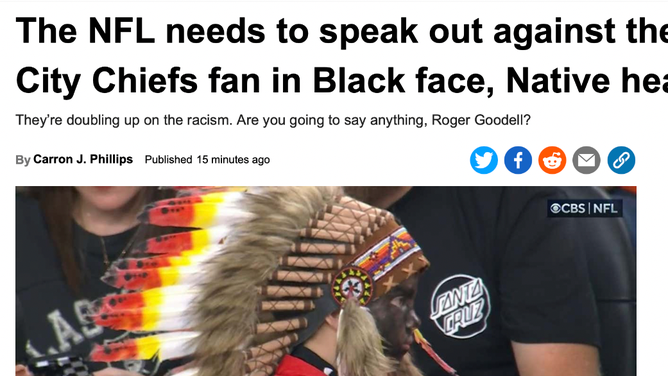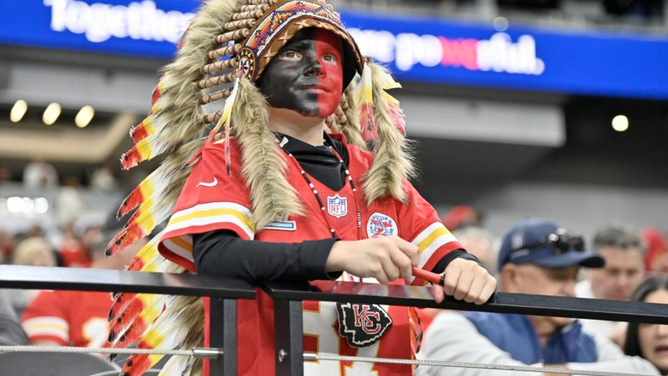Deadspin Cannot Claim Ignorance In Blackface Lawsuit | Bobby Burack
The family of the nine-year-old Kansas City Chiefs fan whom Deadspin framed for wearing blackface filed a lawsuit against the outlet on Monday.
The suit alleges that Deadspin author Carron J. Phillips "maliciously and wantonly" attacked their son as part of a "race-drenched political agenda" to "generate clicks."
Before we provide an analysis of the case, let us first review the facts:
On Nov. 27, 2023, Deadspin posted an article headlined, "The NFL needs to speak out against the Kansas City Chiefs fan in Black face, Native American headdress."
However, the kid was not wearing blackface. He was wearing red and black face paint in support of the Chiefs football team.
The cover photo of the article showed only one side of the fan's face, as shown below:

Here's the full photo that Deadspin, to this day, never uploaded:

The opening paragraph of the article also claimed the face paint proved the fan "hates black people and Native Americans."
The full photo of the fan was available online the night of Jan. 26, a day before Deadspin published its piece. We also sent Deadspin and Phillips the full photo in an email three hours after the publication of the article.
Phillips acknowledged our email almost immediately in a now-deleted tweet, saying he could explain how "red and black face paint is just as offensive as blackface."
He also accused me of "hating Mexicans" in the same post.
Nonetheless, it's inarguable that Deadspin and Phillips both knew they had printed a harmful lie about an innocent 9-year-old kid by mid-afternoon on Nov. 27.
And yet the article remained as is. Deadspin did not correct the article. That's journalism malpractice.
In fact, an editor for the site doubled down on the accusation three days later.
On Nov. 30, the site added an update to the article with a comment from the Santa Ynez Band of Chumash Indians saying they do not support the use of the headdress.
The editor, evidently, thought the tribe's comment justified the article's lies. It didn't.
But the far more demanding takeaway is that Deadspin updated the story days later but neglected to add any of the following corrections, all of which were universally recognized at the time of the update:
– The fan was not wearing blackface.
– The photo Deadspin used was deceptive.
– The boy is Native American.
Now, let's go to Dec. 7.
Deadspin finally updated the story after 11 days. But not in the name of ethics. See, Deadspin only updated the story after receiving a legal threat from the child's parents, Shannon and Raul Armenta.
Their letter demanded a retraction:
"These Articles, posts on X, and photos about Holden and his parents must be retracted immediately. It is not enough to quietly remove a tweet from X or disable the article from Deadspin‘s website. You must publish your retractions and issue an apology to my clients with the same prominence and fanfare with which you defamed them."
Deadspin responded with the following editor's note, placed atop the original article:
Editor’s Note: On Nov. 27, Deadspin published an opinion piece criticizing the NFL for allowing a young fan to attend the Kansas City Chiefs game against the Las Vegas Raiders on Nov. 26 wearing a traditional Native American headdress and, based upon the available photo, what appeared to be black face paint.
Unfortunately the article drew attention to the fan, though our intended focus was on the NFL and its checkered history on race, an issue which our writer has covered extensively for Deadspin. Three years ago, the Chiefs banned fans from wearing headdresses in Arrowhead Stadium, as well as face painting that "appropriates American Indian cultures and traditions." The story’s intended focus was the NFL and its failure to extend those rules to the entire league.
We regret any suggestion that we were attacking the fan or his family. To that end, our story was updated on Dec. 7 to remove any photos, tweets, links, or otherwise identifying information about the fan. We have also revised the headline to better reflect the substance of the story.
Like the initial story, the editor's note is rooted in a lie. Well, several lies.
The editor claims the outlet was not aware of the truth until it received a letter from the family's lawyers. We already established the full photo that was available prior to publication. If nothing else, Deadspin was aware of the truth three hours after publication, as confirmed by Phillips, but did not correct the story.
Secondly, the editor’s note states the "intended focus [of the article] was on the NFL" and not the fan. That's not true. The first paragraph of the article claimed the kid – not the NFL -- "hated both black people and Native Americans."
Simply put, Deadspin cannot claim ignorance as a defense. It's lies were willful.
Deadspin and Carron J. Phillips defamed a 9-year-old fan. They stood by their lie for over a week until legal action was threatened. And, in the process, incited death threats towards the Armenta family.
"Deadspin’s lies have caused the Armenta Family enormous damage. They have exposed the family to a barrage of hate, including death threats ("I’m going to kill [H.A.] with a wood chipper") and insults (calling H.A. a "p-ssy," a "mother fucker," and a "n-gg-r"). They have made Raul a pariah at work, forcing the family to consider moving out of state. And they have branded a nine-year-old child with false allegations that will live forever online. H.A. has already suffered significantly—his test scores and grades have dropped in school, and he has shown emotional damage from the onslaught of negative attention."
The lawsuit's use of the words "malicious and wantonly" seems appropriate.
OutKick founder Clay Travis, who is also a lawyer, agrees. He predicted "bankruptcy is coming," as a result.
Lexie Rigden, an attorney and frequent legal analyst for Fox News, provided the following explanation to OutKick about the lawsuit and the family's chances of succeeding:
"Although defamation laws vary state by state, in general, to prove defamation, a plaintiff would have to show that a false statement was made (i.e. that this child is wearing blackface); that the statement was published to third parties (easy--it's all over the internet, with even Elon Musk commenting); that the defendant knew it was false or was at least was negligent in publishing it (Phillips and Deadspin saw the full photo and knew the context in which it was taken); and damages, that some harm was caused to the plaintiff's reputation (the death threats cited in the lawsuit)."
Let's see:
Deadspin published a false statement. Check.
Third parties re-published the false statement. Check.
Deadspin and Phillips knew they printed a false statement. Check.
The kid and his parents endured damages by way of threats and harassment. Check.
Translation: defamation.
Fitting it'd be if an innocent little boy who attended a Chiefs' game who is the one to finally bury the filth reeking from what remains of Deadspin.